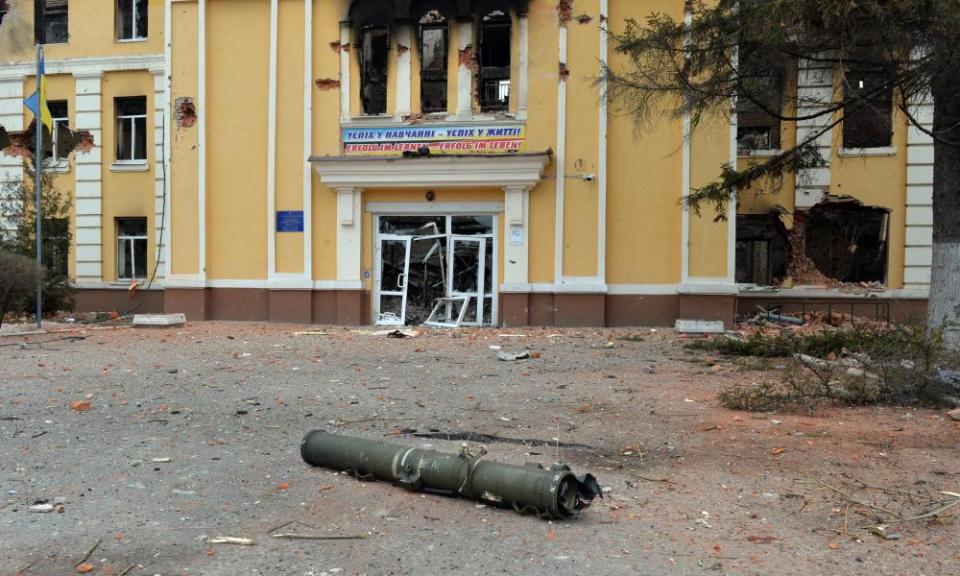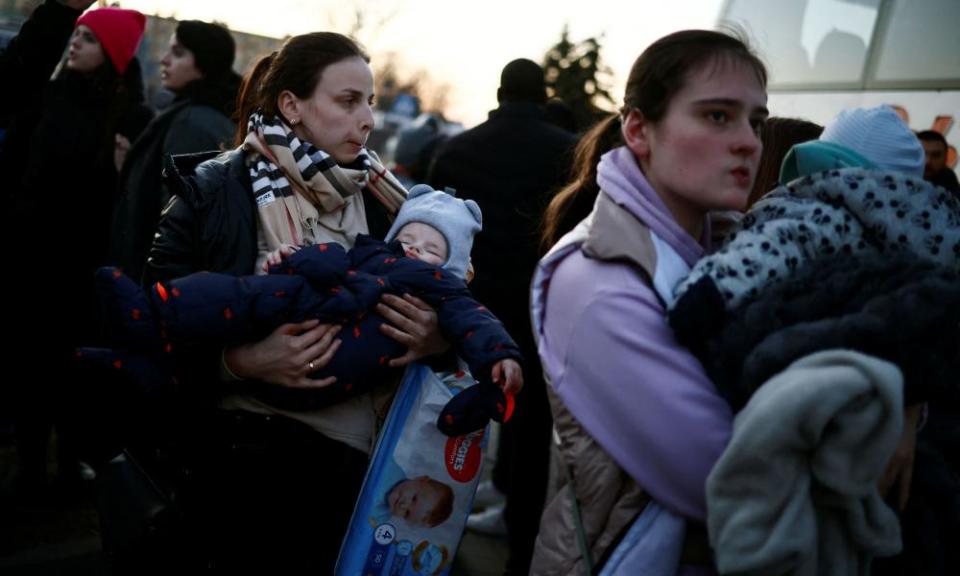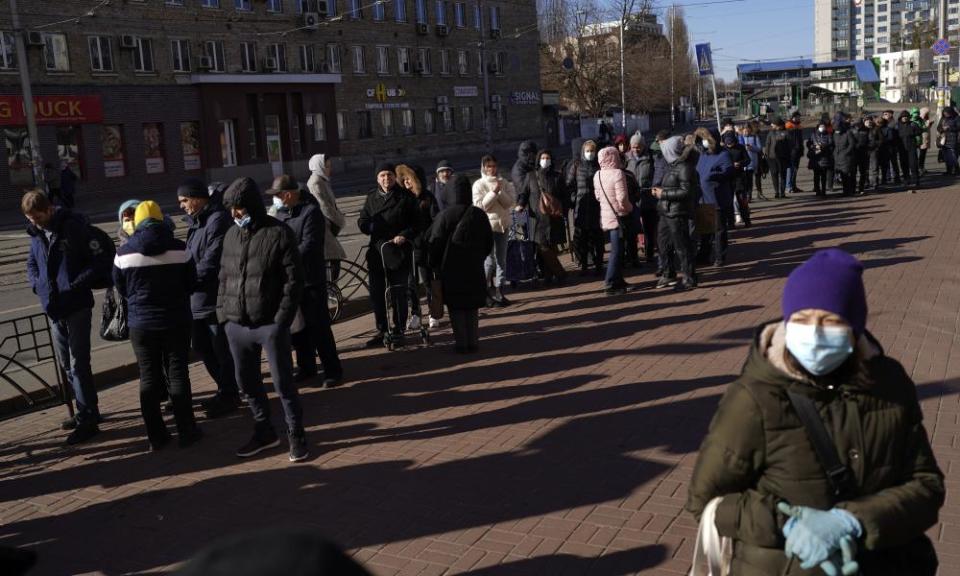Russia launches multiple rocket attacks in Kharkiv and renews Kyiv assault
Russian forces have launched rocket attacks that killed “dozens” of civilians in Ukraine’s second city, and began a renewed assault on the capital Kyiv, as Moscow faced unprecedented western sanctions and isolation.
Widespread use of indiscriminate weapons such as multiple rocket launchers against civilian areas, as used on Monday in the city of Kharkiv, suggested that the Kremlin, having failed to land a knockout blow in the first days of the war, was prepared to unleash more desperate methods.
The prosecutor of the international criminal court said he would launch an investigation into possible war crimes or crimes against humanity in Ukraine.
Late on Monday, the Ukrainian ambassador to the US accused Russian forces of using a thermobaric weapons, which use oxygen from the surrounding air to generate a high-temperature explosion. “The devastation that Russia is trying to inflict on Ukraine is large,” said Oksana Markarova.
Satellite photos showed long Russian columns heading towards Kyiv. The satellite imaging company Maxar published a picture of a 17-mile (27km) convoy of forces about 30 miles from the capital. Inside Kyiv, air raid sirens sounded as evening fell and several detonations were reported. Blasts were also heard in Mariupol on the coast of the Sea of Azov. However, Russian forces have yet to take any major Ukrainian city. Turkey said it would ban all warships from crossing the Bosphorus and Dardanelles straits leading to the Black Sea, blocking the route for at least four Russian vessels which are waiting to cross from the Mediterranean.
The Élysée Palace said after a call between Emmanuel Macron and Vladimir Putin that the Russian president had said he was “willing to commit” to ending attacks on civilians and civil infrastructure while ceasefire talks were taking place between Russian and Ukrainian officials in Belarus.
But on the fifth day of fighting and with Russian forces advancing more slowly than many analysts had expected, the Ukrainian interior ministry adviser Anton Herashchenko said on Monday Kharkiv had been “massively fired on”, leaving “dozens of dead and hundreds of wounded”.

The talks between Russian and Ukrainian delegations near the Belarus-Ukraine border ended inconclusively, with national news agencies quoting officials as saying the negotiators would return to their respective capitals for consultations before embarking on a second round of talks in the coming days.
The Ukrainian presidential adviser Mykhailo Podolyak described negotiations as “difficult” and said: “Unfortunately, the Russian side is still extremely biased regarding the destructive processes it launched.”
The Ukrainian president, Volodymyr Zelenskiy, urged Russian troops to abandon their equipment and leave the battlefield to save their lives, claiming 4,500 were already dead.
Russia’s nuclear forces were placed on high alert, it was announced on Monday, in line with Putin’s orders to his defence chiefs the day before, but it was unclear if the alert involved the movement of the country’s nuclear weapons, or the deployment of personnel to command and control facilities. Meanwhile Russia’s foreign ministry said on Monday that those supplying lethal weapons to Ukraine would bear responsibility should they be used during the war.
A senior US intelligence official said the president of Belarus, Alexander Lukashenko, who has backed Putin’s military assault on Ukraine after earlier playing an intermediary role, could also send troops to help Russia in the next 24 hours.
Western analysts also said they were alarmed by a referendum vote in pro-Russian Belarus that could result in nuclear weapons being stationed on the country’s soil for the first time since the fall of the Soviet Union.
Terrified Ukrainian families huddled in shelters, basements or corridors, with millions thought to have fled their homes and more than 500,000 having left Ukraine to escape the biggest invasion of a European country since the second world war.

Russia’s defence ministry said its forces had taken control of the towns of Berdyansk and Enerhodar in Ukraine’s south-eastern Zaporizhzhia region, as well as the area around the Zaporizhzhia nuclear power plant.
The International Atomic Energy Agency (IAEA) said it had information that “Russian forces were operational near the site but had not entered it at the time of reporting”. The IAEA’s director general, Rafael Grossi, “stressed that any military or other action that could threaten the plant’s safety or security must be avoided”.
At least 102 civilians in Ukraine have been killed, with 304 more wounded, but the real figure will be “considerably higher”, the UN human rights commissioner, Michelle Bachelet, said earlier on Monday. A US defence official said Russia had fired more than 350 missiles.
Karim Khan, the ICC prosecutor, said he would open an investigation into possible war crimes or crimes against humanity in Ukraine, based both on a prior report by his predecessor in 2020, and on current military operations. Khan said he had already instructed his team to take steps to preserve evidence.
Western officials said there would be “a requirement to record and capture” attacks on civilians to establish whether war crimes had been committed by the unnecessary targeting of civilians by Russian forces. At least seven were reported to have died after what appeared to be indiscriminate rocket strikes on Kharkiv on Monday, although an Ukrainian official said “dozens” had been killed.
“I think we will be very attentive and alert to war crimes or breaches of international humanitarian law in this conflict,” said one official, although they said it was too soon comment whether they thought the attack on Kharkiv was a breach, or whether they believed cluster munitions that are banned by the UK and many other European nations but not Russia or the US had been used.
On Monday, the UN general assembly began an emergency session to address the Russian invasion. Ukraine’s allies are hoping to get the support of more than 100 countries to support a resolution condemning Russia, in an attempt to press home Moscow’s isolation.
The Kremlin conceded on Monday that Russia’s economic reality had changed, but said there was no reason to doubt its central bank, which raised interest rates to 20% as it sought to shield the economy from tough new western sanctions.
Related: ‘The damage is done’: Russians face economic point of no return
Panicked Russians withdrew savings and sought to exchange roubles for dollars and euros, while Russian businesses scrambled to protect their finances as the rouble lost nearly 30% of its value against the dollar on Monday.
Measures adopted by the US, the UK, EU member states and other countries have blocked some Russian banks from the Swift international payments system and severely restricted the Russian central bank’s ability to access its $640bn (£477bn) of reserves.
In a further crippling blow, the US on Monday imposed swingeing new sanctions, in effect blocking Americans from engaging in any transactions involving Russia’s central bank, finance ministry or national wealth fund.
“The economic reality has considerably changed,” said the Kremlin spokesperson, Dmitry Peskov. “These are heavy sanctions, they are problematic, but Russia has the potential to offset the harm. Russia has been making plans for quite a long time.”
The EU has also shut all Russian planes out of its airspace, forcing the Russian airline Aeroflot to cancel all flights to European destinations until further notice. The Russian state media outlets RT and Sputnik have also been banned in the EU.
Switzerland on Monday set aside its tradition of neutrality and said it would adopt all sanctions already imposed on Russia by the EU. “This is a big step for Switzerland,” said the country’s president, Ignazio Cassis.
On Monday, Shell announced it would follow BP in divesting from its joint ventures in Russia, withdrawing from projects with the Russian gas corporation, Gazprom.
In addition to sanctions, the US and several EU countries have announced they will send Stinger missiles and other military supplies to Ukraine. Germany has said it will increase defence spending massively, casting off decades of reluctance, while in a similarly radical change of policy Finland said it would send weapons and ammunition to Ukraine, the prime minister, Sanna Marin, said.
For the first time in its history, the EU signed off on an agreement to finance the purchase and delivery of weapons to a country under attack, providing €500m (£420m) of military equipment to the Ukrainian armed forces in a move described as a “watershed moment”. Nato partners are also providing Ukraine with air-defence missiles and anti-tank weapons, the alliance’s secretary general, Jens Stoltenberg, tweeted on Monday.

Peskov doubled down on Monday on the Kremlin’s logic for sending Russian forces into Ukraine, saying western arms supplies showed that Moscow was right to try to demilitarise its neighbour and accusing the EU of hostile behaviour.
Russia’s growing diplomatic isolation continued, with the UN human rights council agreeing on Monday to Ukraine’s request to hold an urgent debate on the invasion.
Zelenskiy on Monday also formally signed an official request for Ukraine to join the EU. The bloc said it was is expecting Ukraine’s application “imminently”, which officials in Brussels said “would need to be assessed very rapidly by the council, and a decision made as to whether to request an urgent opinion from the Commission”.
Western officials believe Putin wants to overthrow Ukraine’s government and replace it with a puppet regime. His instructions on Sunday for Russian nuclear readiness raised fears that the invasion could lead to nuclear war by design or mistake.

 Yahoo News
Yahoo News 
